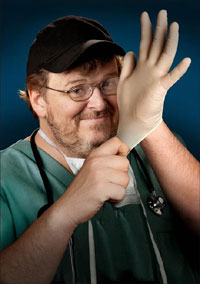| ||
A master storyteller and his tale
by Judith Reynolds Like a savvy lawyer, documentary filmmaker Michael Moore knows how to marshal evidence. At the beginning of “Sicko,” his new documentary about the American health-care system, Moore assembles medical horror stories one after another. “This is Adam,” he innocently begins. It’s an echo of the classic fairytale opening, “Once upon a time.” But it carries a punch that accumulates after you hear from Rick, Donna, Frank, Laura, Jason, Doug and Maria, all of whom experienced a serious accident or illness and encountered a dragon bureaucracy with one fiery message: Service Denied. All this is done in Moore’s trademark style: straightforward narration, on-camera interviews and jaunty music. The effect is highly ironic. Chirpy, Disneyesque tunes accompany tales of severed fingers, multiple heart attacks, cancer and a car accident where ambulance coverage was denied for not being pre-approved. A labyrinth of disasters, the sequence establishes Moore’s case. And like classic Grimm brothers’ stories, the horrific narrative is told to innocent, unbelieving children – Americans who have succumbed to a for-profit health-care system established by the insurance and pharmaceutical industries. That they are in compliance with politicians and their Cheshire twins, the lobbyists, only adds to the darkness. Biased? Yes. Powerful? Indeed. Moore has no intention of balancing his argument with success stories of the privileged who receive first-class, high-tech care. This is advocacy filmmaking. Fifty million Americans have no health insurance, and the numbers are growing. The film has a cast of characters, heroes and villains, who thread their way through the movie. Wisely, Moore has diminished his own role. He narrates and appears occasionally, but he doesn’t dominate the footage. And like every solid storyteller, Moore makes his heroes and villains come alive through concrete details and telling anecdotes. Two inspired discoveries unearthed three volunteer rescuers from the 9/11 disaster and insurance insiders willing to go on camera with creepy foreknowledge of procedural denials. John, Bill and Reggie suffer debilitating medical conditions and reappear several times. In archival footage, villain-turned-hero, Dr. Linda Pino, admits to a government investigating committee that she knowingly denied coverage for an operation that would save a man’s life. The insurance company lauded her and gave her a financial bonus. The man died; her guilt didn’t. Once Moore exposes the diseased skeleton of our system, he examines the universal health-care systems in Canada, the United Kingdom and France. He interviews patients, doctors, and American expats, and even goes on a mission to try and pay a bill – somewhere, anywhere in a system that is unbelievably “free.” Of course that comes with a price, higher taxes and a social contract based on “we,” not “me,” as Moore points out later in the film. Throughout the exploratory section, that old American boogeyman, the threat of “socialized medicine,” raises its head. Moore confronts the issue, the fear behind it, and quickly reminds us that we have any number of services that are “socialized: ” fire and police protection, streets and parks, highways, not to mention education. It is the exploration of differing social contracts that drives the film toward its spectacular end. Moore keeps in touch with principal characters from the beginning, most notably the three volunteer rescuers. He invites them on a voyage toward health – from Miami harbor to the American base at Guantanamo. Accompanied by patriotic music, a small flotilla rides out to sea; it’s vintage Moore. Alas, the sick and wounded are denied entry to the U.S. base where state-of-the-art health care is free to all enemy combatants. It’s a dramatic moment and the emotional climax of the film. Yet it is the anti-climax where Moore winds down with one more story. Over Strauss’ calming “Blue Danube Waltz,” he and his band take a detour into Havana. There they receive free medical care, drugs and an honor guard salute from local firefighters. Organized for the 9/11 volunteer rescuers, the tribute is unexpected and deeply appreciated – a moment of high formality in an otherwise seat-of-the-pants film. In the epilogue, Moore recapitulates his premise: our for-profit system makes outcasts of millions while other countries with a deeper social bond offer universal health care. We rank 37th in overall citizen well-being, just above Slovenia. Toward the end, Moore poses a key question: Who are we? Is this what we’ve become? Is this what we want? •
|
In this week's issue...
- May 15, 2025
- End of the trail
Despite tariff pause, Colorado bike company can’t hang on through supply chain chaos
- May 8, 2025
- Shared pain
Dismal trend highlights need to cut usage in Upper Basin, too
- April 24, 2025
- A tale of two bills
Nuclear gets all the hype, but optimizing infrastructure will have bigger impact


